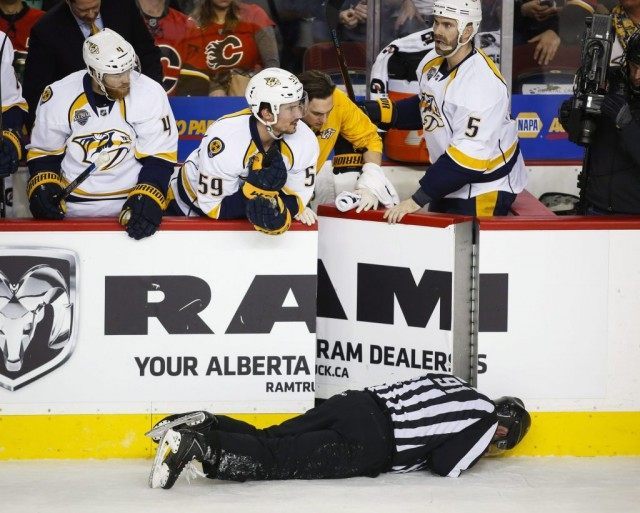The NHL rejected a “concussion defense” for Dennis Wideman cross-checking a referee and upheld a suspension of the Calgary Flames defenseman for 20 games in a ruling publicized on Wednesday.
Wideman cross-checked a referee during a January 27th game against the Nashville Predators. The National Hockey League Players Association (NHLPA) appealed the suspension on behalf of Wideman on February 3rd but Commissioner Gary Bettman rejected the arguments therein.
In their appeal, the NHLPA raised an interesting and potentially thorny defense for the Wideman hit — namely that Wideman suffered from a concussion that he received just moments before he cross-checked the referee.
The NHLPA argued that “no discipline is appropriate because Mr. Wideman’s conduct was not deliberate and was not the result of any intent to injure. They contend that Mr. Wideman’s concussion just prior to the incident rendered him confused and/or physically incapable of avoiding contact with Mr. Henderson.”
This week, NHL Commissioner Gary Bettman released a 23-page order denying the appeal of Wideman’s suspension.
Despite the testimony of a neurologist and a neuropsychologist on behalf of Wideman and the NHLPA, Commissioner Bettman upheld the suspension and refused to accept the “concussion defense.”
While the Commissioner accepted the expertise of the doctors who offers support to the NHLPA position, Bettman rejected the “concussion defense,” writing that:
As noted, I accept that Drs. Comper and Kutcher are experts in neuropsychology and neurology, respectively. However, although they are experienced clinicians, neither treated Mr. Wideman or was responsible for diagnosing his medical condition. Moreover, their testimony was not simply about the diagnosis or symptomology of concussions. Rather, both were retained by the NHLPA (for whom each has performed services for many years) for the purpose of opining as to what his mental and/or physical state was at the time of the incident in question. In order to do so, they relied on remote, brief interviews with Mr. Wideman conducted several days after the incident (at a time when he was well aware that he was the subject of an imminent supplementary discipline hearing) and their own review of the video footage. As discussed in greater detail below, the conclusions expressed by Dr. Comper and Dr. Kutcher were not based on what Mr. Wideman’s capacity ~actuall was at the time in question but about what his condition Those conclusions were based on little more than Mr. Wideman’s own subjective report of concussion symptoms that he may or may not have actually experienced. The testimony was internally inconsistent in several respects, hedged or vague in other respects and largely belied by what is plainly visible on the video. For these reasons, and based on my review of the video of the incident, Drs. Comper and Kutcher do not come close to persuading me that the decision to suspend Mr. Wideman was not supported by clear and convincing evidence.
Brian Burke, president of hockey operations for the Calgary Flames, didn’t hold back in his criticism of Bettman’s ruling. In an interview on SportsNet, the characteristically sharp-tongued Burke said:
To take a week to rubber-stamp a decision that was made by the hockey operations department of the National Hockey League — as games tick off for my player, that affect my team’s ability to win, that affect playoff races, that affect competitive balance — is incomprehensible to me. We disagree vehemently with the the decision that was reached here. We were astonished by it. We don’t understand it. We disagree with it completely.
The NHL, like other professional sports leagues, has been grappling with the concussion issue for years now. Wideman and the NHLPA’s assertion of a “concussion defense” has once again focused some rather unwanted attention on the league on the issue of brain trauma.
While Bettman rejected the “concussion defense,” his ruling does not end the story. Pursuant to a new collective bargaining agreement between the league and the NHLPA, the suspension can and will be appealed to an independent third party. The appeal will be the first of its kind in the NHL.

COMMENTS
Please let us know if you're having issues with commenting.